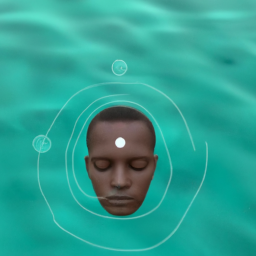I have constantly been intrigued by the realm of dreams and the potential symbolism they hold. Dreams frequently serve as a mirror to our innermost thoughts and can provide valuable insights into our fears, aspirations, and feelings.
One common dream that many people experience is swimming. But what does it mean when we dream about swimming? In this article, I will explore the symbolism of water in dreams and the different types of swimming dreams. From effortlessly swimming in clear waters to struggling to stay afloat in murky waters, each dream can offer a unique interpretation.
Additionally, I will examine the connection between swimming and our emotions, as well as how our life situations may be reflected in these dreams. So, let’s dive in and explore what dreams about swimming may reveal about our inner selves.
Key Takeaways
- Dreams about swimming can reflect our subconscious mind and emotions, as water represents the unconscious mind and purification.
- Effortlessly swimming in a dream represents ease, emotional freedom, and control over emotions, while struggling to stay afloat indicates overwhelming stress and lack of control.
- Recurring dreams about swimming may indicate underlying emotional issues such as anxiety or unresolved trauma, and seeking professional help can provide support and guidance.
- Swimming can be seen as a metaphor for our emotional lives, and understanding dream symbolism can promote self-awareness and personal growth.
Overview of Dream Interpretation
Dream interpretation can be a bit mysterious, but it’s fascinating to explore what our subconscious might be trying to tell us while we sleep. Dreams can be full of symbolism, and swimming is a common theme that can appear in various ways.
Whether you’re swimming in a pool, ocean, or river, it’s important to pay attention to the details of your dream and what they might represent. The symbolism of water in dreams is vast, and it can represent different things depending on the context.
For example, swimming in calm waters might indicate a sense of peace and tranquility, while swimming in rough waters might suggest that you’re facing some challenges or obstacles in your waking life. Understanding the symbolism of water in your dreams can help you gain insight into your subconscious thoughts and emotions.
Symbolism of Water in Dreams
You may not realize it, but water in your dreams can hold significant symbolic meaning. Here are 4 reasons why:
-
Water represents emotions: In dreams, water can symbolize the state of our emotions. Calm water may indicate a peaceful state of mind, while rough water could indicate feelings of turmoil or anxiety.
-
Water represents the unconscious mind: Since water is often associated with the unconscious mind, dreams about water can be a sign that our subconscious is trying to communicate with us.
-
Water represents change: Water is a powerful force that can transform the landscape around it. In dreams, water can symbolize the change we need to make in our waking life.
-
Water represents purification: Water is often used in religious and spiritual rituals as a symbol of purification. In dreams, water can represent the need to cleanse ourselves of negative thoughts and emotions.
With this understanding of the symbolism of water in dreams, we can now explore the different types of swimming dreams.
Different Types of Swimming Dreams
Now let’s dive into the various types of swim-related dreams you might have experienced lately.
One common type of swimming dream is struggling or drowning in water. This could indicate feelings of being overwhelmed or out of control in waking life. It may also symbolize emotions that have been suppressed and are now resurfacing.
Another type of swimming dream is swimming effortlessly or gliding through water. This can represent a sense of ease and comfort in navigating through life’s challenges. It may also suggest a feeling of emotional freedom and release.
In the next section, we’ll explore the interpretation of effortless swimming dreams in more detail.
Interpretation of Effortless Swimming Dreams
Gliding effortlessly through water in a dream may suggest that navigating through challenges in waking life could come with ease and comfort, potentially indicating a sense of emotional freedom and release. This type of dream often signifies a state of calmness and tranquility, where the dreamer is able to move through life with grace and ease. It could also imply that the dreamer has a strong sense of control over their emotions and can handle any situation that comes their way.
If you’ve had a dream about effortless swimming, it’s important to pay attention to the details of the dream. Did you feel happy and content while swimming? Were you completely relaxed and at peace? Understanding the nuances of the dream can help you gain insight into your emotional state and how you approach challenges in your waking life.
On the other hand, if you had a dream about struggling to stay afloat, it may indicate a sense of overwhelm or anxiety.
Interpretation of Struggling to Stay Afloat Dreams
Feeling like you’re constantly struggling to stay afloat in a dream can be a sign of overwhelming stress and a lack of control in your waking life. This dream may indicate that you are feeling overwhelmed by your responsibilities or challenges, and you are struggling to manage them.
It’s possible that you’re feeling like you’re drowning in your problems and cannot find a way to escape them. This dream can also be a sign that you are lacking the necessary resources or support to overcome the obstacles in your life.
If you often dream about struggling to stay afloat, it may be helpful to take a step back and assess your situation. Consider talking to a trusted friend or professional about your stress and finding ways to cope with it.
Additionally, try to prioritize your responsibilities and break them down into smaller, manageable tasks. By taking control of your life and finding ways to manage your stress, you may find that these types of dreams become less frequent.
Next, let’s explore the interpretation of swimming in dirty water dreams.
Interpretation of Swimming in Dirty Water Dreams
You might be grossed out by the idea of swimming in dirty water, but if you’ve had a dream about it, it could be a sign of emotional turmoil and negative emotions that you’re struggling to deal with. Here are some possible interpretations of this type of dream:
-
You’re feeling overwhelmed by negative emotions: Swimming in dirty water could be a symbol of feeling overwhelmed by negative emotions, such as anger, sadness, or fear. These emotions might be related to a specific situation in your life, or they could be more general feelings of anxiety or stress.
-
You’re struggling to let go of something: Swimming in dirty water could also be a sign that you’re struggling to let go of something in your life. This could be a past relationship, a job, or a habit that you know is unhealthy but can’t seem to break free from.
-
You’re feeling stuck: This type of dream could also indicate that you’re feeling stuck in some aspect of your life. You might feel like you’re not making progress towards your goals or that you’re trapped in a situation that you can’t escape from.
-
You need to take action: Finally, swimming in dirty water could be a wake-up call that you need to take action to improve your situation. This could mean seeking help from a therapist or taking steps to make changes in your life that will help you feel more in control.
If you’ve had a dream about swimming in dirty water, it’s important to pay attention to your emotions and try to identify any negative feelings that you might be struggling with. Understanding the connection between swimming and emotions can help you gain insight into your own psyche and take steps towards healing and growth.
Connection Between Swimming and Emotions
If you’re struggling to understand the connection between swimming and emotions, it’s time to dive deeper and explore the depths of your psyche with an open mind and heart, allowing yourself to be vulnerable and receptive to the insights that may arise. Swimming is a physical activity that requires a certain level of emotional control, as well as an ability to navigate the ever-changing currents of life. In many ways, swimming can be seen as a metaphor for our emotional lives, as we struggle to stay afloat amidst the waves of stress, anxiety, and uncertainty.
To better understand the connection between swimming and emotions, it’s helpful to examine the ways in which this activity can impact our mental and emotional states. The following table provides a brief overview of some of the key emotional benefits of swimming, as well as some potential challenges that may arise when we engage in this activity:
| Emotional Benefits | Potential Challenges |
|---|---|
| Relaxation | Fear of water |
| Stress relief | Physical exhaustion |
| Improved mood | Competition |
| Increased self-esteem | Self-consciousness |
| Sense of accomplishment | Comparison to others |
As we can see from this table, swimming can be a powerful tool for promoting emotional well-being, but it can also be a source of stress and anxiety. By understanding these emotional dynamics, we can better navigate our own emotional lives and use swimming as a means of promoting greater emotional health and happiness. With this in mind, let’s explore the connection between swimming and life situations.
Connection Between Swimming and Life Situations
By delving into the connection between swimming and various life situations, I’ve come to realize that this activity can hold a lot of meaning in our lives.
Just like swimming, life can be unpredictable and full of obstacles. Sometimes, we may feel like we’re drowning and struggling to keep our heads above water. Other times, we may feel like we’re gliding effortlessly through life.
However, no matter what situation we find ourselves in, swimming can serve as a powerful metaphor for how we navigate these challenges. For example, when we swim, we must learn to control our breath and pace ourselves in order to conserve energy and avoid exhaustion.
Similarly, in life, we must learn to manage our emotions and take breaks when needed in order to avoid burnout. By examining the connection between swimming and life situations, we can gain insight into how we can use this activity as a tool for personal growth and resilience.
With this in mind, let’s explore some techniques for analyzing dreams and unlocking their hidden meanings.
Techniques for Analyzing Dreams
When it comes to analyzing dreams, I’ve found that journaling is an effective technique. Writing down my dreams as soon as I wake up helps me remember details and emotions, and allows me to reflect on their possible meanings.
If I’m struggling to make sense of a dream, seeking professional help from a therapist or counselor can also be beneficial. They can offer insights and guidance in interpreting and understanding the symbolism in my dreams.
Journaling
Start journaling about your dreams of swimming to better understand your subconscious mind. Write down every detail you can remember, including the setting, the people present, and any emotions you felt during the dream.
It’s important to record your dreams as soon as you wake up, as they can quickly fade from memory. By keeping a dream journal, you can begin to identify patterns and symbols in your dreams that may reveal deeper meanings.
Journaling can also help you process any unresolved emotions or anxieties that may be causing you to have recurring dreams about swimming. For example, if you constantly dream about drowning, it may be a sign that you are feeling overwhelmed or suffocated in your waking life.
Once you have a better understanding of your dreams, you can take steps to address these underlying issues. If you find that your dreams are causing significant distress, seeking professional help may be a good next step.
Seeking Professional Help
If you’re struggling to cope with the distress caused by your recurring swimming-related dreams, don’t hesitate to seek professional help. It’s completely normal to feel overwhelmed, and talking to a therapist can provide you with the support and guidance you need to overcome these feelings.
A therapist can help you explore the underlying issues that may be contributing to your dreams, such as anxiety, stress, or unresolved emotional trauma. They can also teach you coping mechanisms to manage your emotions and reduce the frequency or intensity of your dreams.
Here are four ways seeking professional help can benefit you:
-
A therapist can provide a safe and confidential space to talk about your dreams and any related concerns.
-
They can help you identify patterns and triggers that may be contributing to your dreams.
-
They can teach you techniques to manage your anxiety and emotions, such as mindfulness and relaxation exercises.
-
They can provide you with referrals to other healthcare professionals if necessary, such as a sleep specialist or psychiatrist.
Frequently Asked Questions
Are swimming dreams more common in certain age groups or demographics?
I can’t say for certain, but in my experience, swimming dreams seem to be fairly common across all age groups and demographics. It’s possible that certain factors, such as personal experiences or fears, may influence the frequency of these dreams.
Can the meaning of a swimming dream change depending on the specific body of water being swam in?
Depending on the specific body of water, the meaning of a swimming dream can vary. For example, swimming in a calm lake may represent peace while swimming in turbulent ocean waters may symbolize emotional turmoil.
Is there any scientific evidence to support the idea that swimming dreams are connected to actual swimming ability or experience?
There is currently no scientific evidence to support the idea that swimming dreams are connected to actual swimming ability or experience. Dream interpretation is subjective and varies from person to person.
How do cultural or personal experiences with swimming impact the interpretation of swimming dreams?
My personal experiences with swimming shape the way I interpret swimming dreams. For example, a positive experience may lead me to see the dream as a good omen, while a negative one may indicate a warning or fear.
Can recurring swimming dreams indicate a deeper psychological issue or trauma?
Recurring swimming dreams may suggest a deeper psychological issue or trauma. I’ve heard that these dreams can represent a desire for emotional cleansing or a need to confront one’s fears and anxieties.
Conclusion
So, what do dreams about swimming mean? After exploring the symbolism of water in dreams and the different types of swimming dreams, it’s clear that swimming dreams can reveal a lot about our emotions and life situations.
Whether we’re effortlessly swimming in clear water or struggling to stay afloat in dirty water, our dreams are trying to tell us something. Interestingly, studies have shown that 75% of people have experienced a dream about swimming at some point in their lives.
This statistic highlights the commonality of swimming dreams and emphasizes the importance of understanding their meanings. By analyzing our dreams and reflecting on our emotions and life situations, we can gain valuable insights and make positive changes in our waking lives.
So, the next time you have a dream about swimming, take note and see what your subconscious is trying to tell you.









